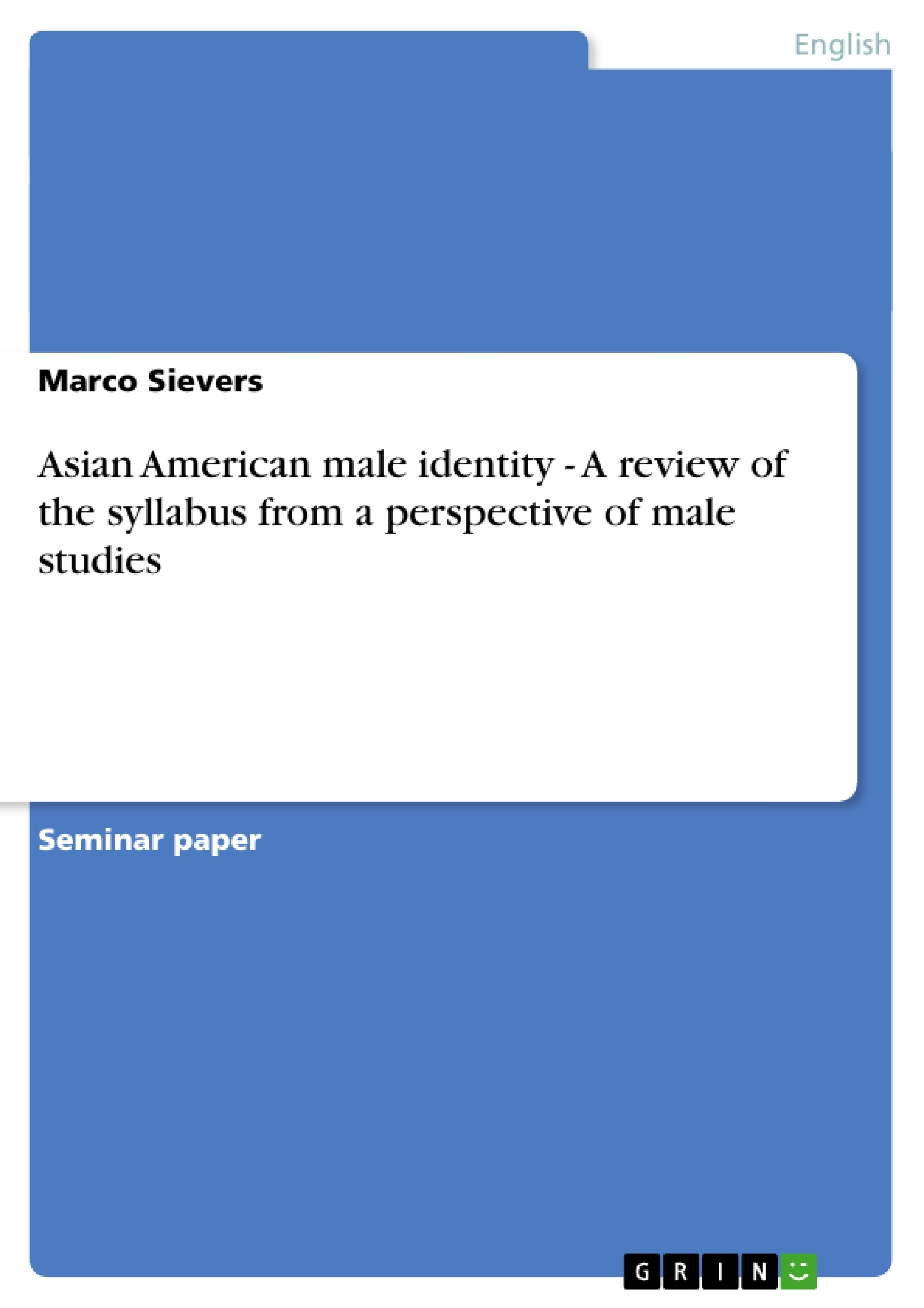Reviewing the syllabus and trying to sketch an overview of Asian American Literature its inherent problem of heterogeneity occurs, which shows that the term “Asian American” is only a makeshift and vague, but nevertheless necessary label. This heterogeneity especially complicates a revision from a view of male studies, because it applies to the authors as well as to characters of the texts and makes it difficult to state general explanations. In spite of this problem red thematic lines can be traced and analysed. They depict thoughts, emotions, needs and problems of Asian American men and shed a light on their identities and inner struggles. But is there really something that can be called an Asian American male identity as a common ground or do these men only share certain problems concerning their masculinity?
This paper will examine the topic of male identity within the syllabus including theories of male studies. Of course, its insights are not general, but dependent on and limited by the fiction of the texts. Nevertheless, will it show that the creation of an Asian American male identity is subject to special problems which arise from the belonging to two social and cultural environments.
Inhaltsverzeichnis (Table of Contents)
- Introduction
- Main Part
- Identity
- Theories of Male Studies
- Psychological Approaches
- Psychoanalytic Approach
- Lacan's Mirror Stage / Delimitation to Mother
- Sociological Approaches
- Social Role Theory
- Social Relation Theory
- Dependence on U.S. Foreign Policy
- Working Conditions, Social Status and Race
- Relationships to Women
- Relationships to Their Children
- Conclusion
- Cultural Approach
- Importance of Family
- Traditional Hierarchies and Arranged Marriages
- Other Specific Cultural Norms
- Conclusion
- Psychological Approaches
- Conclusion
- Works cited:
Zielsetzung und Themenschwerpunkte (Objectives and Key Themes)
This paper aims to examine the topic of male identity within the syllabus, including theories of male studies. It analyzes how Asian American male characters in the literature grapple with the complexities of their identity, particularly in the context of belonging to two different social and cultural environments.
- Exploring the concept of Asian American male identity
- Analyzing the influence of social and cultural norms on identity formation
- Applying theories of male studies to understand the experiences of Asian American men
- Examining the relationship between individual agency and social constraints in shaping identity
- Highlighting the complexities and contradictions inherent in Asian American male identity
Zusammenfassung der Kapitel (Chapter Summaries)
The introduction explores the challenge of defining "Asian American" and its implications for understanding male identity within this diverse group. It acknowledges the heterogeneity of experiences and argues for the need to identify common themes and struggles.
The main part delves into the complexities of identity, exploring both its content and the degree to which it is constructed by individuals versus external forces. It utilizes Jonathan Culler's analysis of the ambiguity of the "subject" to illustrate this interplay.
The chapter on theories of male studies examines various perspectives on the creation and content of male identity, including psychological, sociological, and cultural approaches. It provides an overview of key concepts such as the psychoanalytic approach, Lacan's Mirror Stage, and the role of social norms and expectations.
The chapter on psychological approaches focuses on the psychoanalytic perspective, examining the influence of childhood experiences on the development of male identity. It discusses the role of the "phallic" or "Oedipal" stage and the significance of identification with the father figure. The chapter then analyzes the application of this theory to the literature, considering the complexities of father-son relationships and the impact of immigration on identity formation.
Schlüsselwörter (Keywords)
The central focus of this paper is on Asian American male identity, exploring themes of masculinity, social and cultural norms, individual agency, and the intersection of identity with social and cultural contexts. Key theoretical frameworks include psychoanalytic approaches, Lacan's Mirror Stage, social role theory, and the complexities of belonging to two different cultural environments. It investigates the interplay of individual and societal influences on identity formation, highlighting the challenges and complexities of navigating multiple cultural and social expectations.
Frequently Asked Questions: Asian American Male Identity
What is the main problem with the term "Asian American"?
The term is a makeshift label that covers a vast heterogeneity of cultures and experiences, making it difficult to define a single unified identity.
How do theories of Male Studies apply to Asian American literature?
They help analyze inner struggles, thoughts, and emotions of male characters, focusing on how their masculinity is shaped by belonging to two different cultural environments.
What is Lacan's Mirror Stage in the context of male identity?
It is a psychological approach used to understand how a subject forms a sense of self through external images and the delimitation from the mother figure.
How does U.S. foreign policy affect Asian American male identity?
Sociological approaches show that identity and social status are often dependent on the political relationship between the U.S. and various Asian nations.
What role do traditional hierarchies play in this literature?
The cultural approach examines the importance of family structures, arranged marriages, and specific cultural norms that create contradictions for men living in Western societies.
- Arbeit zitieren
- Dipl.Jurist Marco Sievers (Autor:in), 2005, Asian American male identity - A review of the syllabus from a perspective of male studies, München, GRIN Verlag, https://www.grin.com/document/75985



